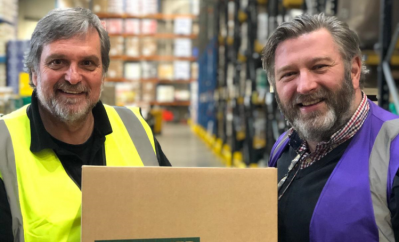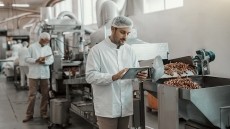Ocado boss: online retail helps cut food waste

Speaking at the City Food Lecture, held at 5pm on 10 February, the boss of the world’s largest dedicated online supermarket claimed the rapid expansion of online grocery shopping was set to continue after the pandemic.
Addressing an international online audience of more than 1,400 food and drink industry leaders, the largest to ever attend the event, she said technology had been the driving force behind Ocado’s success. It had enabled the company to serve the rapid rise in online shopping in the last 12 months.
Growth in online sales
“The growth in online sales has wildly accelerated over the past year. Before the pandemic online grocery sales accounted for 7% of the total market. In 2020, the channel almost doubled to 13%," said Smith. "The UK has one of the highest online penetrations globally, and we expect that the online channel will double in size again over the next few years.
“It’s not an exaggeration to say that COVID is proving to be the catalyst for a permanent shift to online grocery shopping. McKinsey says that consumers take two months to change shopping habits. They have had nine months. 30% of UK consumers say they will shop more for groceries online after the crisis has ended. Those customers who try online shopping quickly recognise the benefits of better choice and less effort.”
Commenting on the surge in demand Ocado had dealt with since the first national lockdown in March 2020, Smith said: "We had a massive increase in demand from March last year as lockdown restriction announcements meant customers wanted to secure their forward orders and bought bigger baskets to minimise the number of trips outside their homes. We sold enough toilet paper rolls that if laid end to end it would take you to the moon and back.
"Despite the challenges, we increased our capacity from existing sites by 40% and delivered a total of 17.7m orders, while maintaining our best-in-market customer experience, delivering 96% of orders on time and keeping our rate of substitutions below 4%. We are also the most COVID safe delivery service for both our customers and colleagues.
"We find as many ways as possible to minimise the number of hands that touch groceries before they reach the customer. We have sold every unit of capacity, and as a result we were the fastest growing grocery retailer in the UK last year."
Smith said the key to Ocado’s success was the technology and automation used throughout its supply chain, which had transformed the online grocery space.
Robotics solutions
She said developing robotics solutions particularly focused on picking had contributed greatly to the business's development.
"Supply chain efficiencies will be central to ensuring we can continue to grow and serve more customers. Picking currently accounts for about 50% of labour costs in our fulfilment centres. There are opportunities to introduce automated solutions to pick faster and better. However it’s not a simple task: to be able to pick and pack, robots have to recognise which items in the crate they need to pick and then understand how to pack them into shopping bags.
"Items need to be densely packed, but fragile goods need to be protected. Have you ever tried to teach a robot not to break an egg? It’s harder than it looks. Developing robotics that mimic the speed, quality and efficiency of a human is not easy, however our amazing technology team have done just that.
"We introduced robotic picking in 2019 and now have three robotic arms operating in our Erith warehouse. This has doubled the rate of pick for ambient products and is an exciting innovation which will ensure we can fulfil even more orders as we roll-out this technology to our other fulfilment centres in the future."
'Hardly any food waste'
Its use of technology had also enabled Ocado to crack down on food waste, said Smith.
“Our technology not only benefits our customers, but also makes our model profitable by reducing costs throughout the supply chain. We produce hardly any food waste. This is partly because we have a really short supply chain, but also because we have a perfect view of what our customers have in their baskets, up to 28 days in advance. This means we are better able to predict what we need from our suppliers and minimises potential waste from buying too much.
"In 2020, our waste was 0.04%; this contrasts with the industry average waste figure of between 2% and 5%. This makes a big difference to our bottom line and we are always investigating new ways to further reduce our food waste and provide our customers with the freshest possible food.
“Longer term, I think the biggest step forward will be taken when retailers can become a real partner for customers who are planning and buying their weekly shop. I think the future of grocery technology will help customers spend less time shopping for groceries, giving them more time back to do what really matters in their lives."
Meal planning
Smith believed technology would continue to advance, taking on more of a role in consumer meal planning. “At Ocado, we already help customers build their order by showing them products they purchase frequently that are not currently included in their basket, and incomplete promotions they will otherwise miss out on.
“The next step on is likely to be better support for meal planning; suggesting and completing recipes based on what is in your basket and ways to use leftover food, like how to use the last half jar of pesto that you bought to use in another recipe that’s now slowly decomposing in the back of the fridge. An average family could save £700 a year by simply not binning food, so helping our customers use food before it goes off would help them to manage their budgets and reduce food waste.
“5G and the growing number of smart appliances also open up huge new possibilities to reduce the amount of time you take to plan your weekly shop. Smart appliances are filled with sensors and connect to the internet to upload and analyse collected data. The future will link your basket to your fridge.
Smart fridge
"Your smart fridge would then be able to take a look inside, work out what you are running low on and what is going out of date, and add it to your basket. Smart appliances will work out how much you really need of staple items based on your consumption patterns and make sure that you buy enough to last until the next shop, reducing the number of times you wake up in the morning and find there is no milk or bread.”
The City Food Lecture is organised by the seven City of London livery companies involved in agriculture and food: the Worshipful Companies of Bakers, Butchers, Cooks, Farmers, Fishmongers, Fruiterers and Poulters. It normally brings together 700 industry leaders, academics and liverymen and students from leading universities at The Guildhall in London every February.
Following the lecture was an online panel discussion chaired by Charlotte Smith, presenter of BBC’s Farming Today. As well as Mel Smith, the panel consisted of food entrepreneur Charlie Bigham, James Walton, chief economist of IGD and Laura Winningham, chief executive of London based food poverty charity, City Harvest.
Mel Smith is the latest in a line of prestigious speakers. In recent years these have included Dutch scientist, academic and broadcaster, professor Louise Fresco, Dominic Blakemore, group chief executive of Compass Group, Tesco chief executive Dave Lewis and former Cadbury Schweppes chairman, John Sunderland.


















